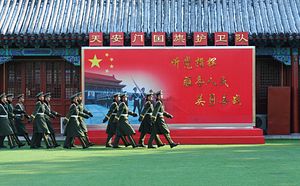China has created a new leading group for reforming the military, according to state media.
On Saturday, Xinhua and other Chinese state media outlets reported that the first plenary meeting of the leading group for deepening reform on national defense and the military had been held. The new leading group will be led by President Xi Jinping, who already chairs the Central Military Commission (CMC). The new leading group is organized under the CMC.
A communiqué issued following the new leading group’s first meeting said that the goal should be to build an army that “obeys the Party’s command, is capable of winning battles and has a sound work style.” Xi has used similar language in the past.
During remarks at the plenary session, President Xi stressed that “National defense and military reform are an important part and an important symbol of China’s overall reform.” At the same time he cautioned that reforms must be undertaken in an “active yet prudent” manner. “Important reform measures must be taken prudently because a slight move in one part may affect the situation as a whole,” Xi said.
The “active yet prudent” phrase was also recently used to describe how urbanization should be carried out, indicating that the Chinese leadership views military reform as one aspect along the broader spectrum of reform. In recent weeks, the same phrase has also been used in state media to describe how everything from the “popularization of family farms” to transgenetic research should be approached.
Xi has made military reform an important part of his tenure as CMC chairman and General Secretary of the Chinese Communist Party. Very early in his tenure, Xi called for a “strong army” that “obeys the party’s commands, is capable of winning wars, and has a good work style.” In April of last year, he ordered that many PLA officers would have to spend time on the frontlines with regular enlistees. He also has cut down on some of the extravagances and perks senior military officers have historically enjoyed.
Xi has also been active in promoting his favorite generals to high level positions. This is reflected in the new leading group on military reform, which will have two PLA generals, Fan Changlong and Xu Qiliang, as its deputies. Both men also serve as vice chairmen of the CMC, and were promoted to that position immediately before the 18th Party Congress where Xi assumed control of the CMC, indicating that they are close to Xi personally. Fan’s promotion in particular came as a surprise given that he was not even a member of the CMC before becoming one of its three vice-chairmen (two vice-chairmen come from the PLA). Appointing them as the leading group’s deputies also indicates the importance Xi is placing on the issue of military reform.
Chinese analysts tend to agree about the importance of military reform. South China Morning Post, for instance, quoted Ni Lexiong, director of a defense policy research center at Shanghai University of Political Science and Law, as saying: “The military reform is the most important one in terms of implications. Xi is the only person who can handle it and it is a good opportunity to strengthen his authority over the army by pursuing new policies and making appointments.” Ni also said that the growing tensions between China and its neighbors were behind the drive to reform the military to make it more combat ready.
Still, perhaps the greater significance of the new leading group is that is further demonstrates Xi’s consolidation of power. Besides already serving as chairman of the CMC, Xi has been tasked with heading a number of new leading groups, including ones on comprehensive reform, state security and Internet security. Still, all of this could bode well for China’s ability to enact reform should Xi continue to stay committed to this path.

































